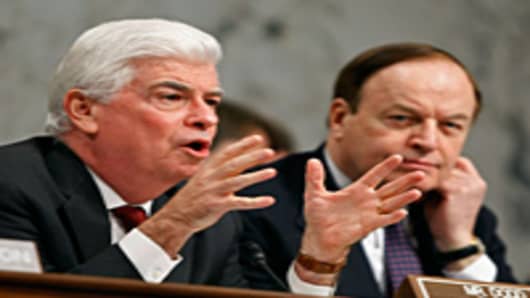Fresh off another procedural defeat for his financial reform bill, Senate Banking Committee Chairman Chris Dodd met with ranking GOP member Richard Shelby again in an effort to craft a bipartisan compromise that would allow Democrats to move the legislation forward for debate.
The vote Tuesday, which was technically a revote of Monday's motion, ended with the Democrats three votes shy of the 60 needed for a super majority under Senate rules. The vote, 57-41, was no better than the day before. Once again, Sen. Ben Nelson of Nebraska broke ranks with the Democratic majority by voting no.
Shelby and GOP leader Mitch McConnell are leading their party's effort to vote in unison against the Democrats, who are trying to avoid a potential filibuster.
Sources say the Democrats plan to hold another vote Wednesday, and presumably more after that if necessary, to get the one or two defections needed to reach 60 votes. Republicans hold 41 seats.
Both parties say they want a strong yes vote, meaning the support of 70-80 members, on the wide-ranging reform legislation, in the wake of the nations worst financial crisis in 80 years, but there's also the chance that one party or the other can force the other's hand by influencing a small number of votes.
The Dodd-Shelby talks, which have been going on for months, have become a last-ditch effort to come up with a group of compromises on several big issues dividing the parties. If successful, the talks would eliminate the threat of a filibuster and presumably yield one big amendment to Dodd's draft legislation.
Meanwhile Shelby's staff Tuesday continued to work on a substitute bill, which will be "finished soon, but not today," according to one source. A summary of the bill was circulating on Capitol Hill Tuesday.
- See a Summary of the Republican Alternative Bill
Democrats are somewhat divided about the utility of the Dodd-Shelby talks at this point. A small group think they are inappropriate, if not unnecessary, while others say more effort should be put into swaying the votes of a couple individual Republicans.
"Negotiate only to get the necessary votes to get it passed," said one senior Congressional staffer familiar with the thinking of President Obama and the Democratic congressional leadership. "Don’t give away the store to get Dick Shelby on board."
That strategy may soon be more evident. Even Republican Whip John Kyl admitted Tuesday that his party doesn't have the votes for a filibuster "even if wanted to."
Getting Nelson on board is another matter.
His second no vote may have been more of a surprise than his first. Going into the Monday vote, he had indicated he would vote against the motion because of concerns about how some provisions would negatively affect Nebraska businesses.
In a statement after Monday's vote, however, he said "no one should view my vote today as an indication that I won't support the bill currently being negotiated by the Banking Committee."
Nelson is reportedly concerned about new federal jurisdiction over insurers as well as oversight of over-the-counter trading of derivatives. Warren Buffett's Berkshire Hathaway,which has both an insurance and reinsurance units, is headquartered in Lincoln, Nebraska.
Derivatives regulation has been an area of contention between Democrats and Republicans and may also be the issue on which the vote turns.
On Sunday, Dodd and his counterpart on the agriculture committee, Blanche Lincoln, reached a compromise agreement on derivatives. (CNBC.com has obtained a copy of the terms.)
The compromise measure came after Lincoln's panel last week passed a measure with tougher restrictions than Dodd's version and managed to secure the vote of a key Republican, Charles Grassley, in the process.
That compromise may also secure the vote of another key Republican, Olympia Snowe, who called for a tough approach to derivatives last Friday in a letter to Reid.
Republicans generally want any derivatives regulation to provide an exception for private companies, which may want to use the financial instrument as a hedge.
Though some Democrats are opposed to such an end-user exception, many are thought to be willing to accept it, as long the legislation creates a new market structure, including trading and clearing procedures.
Republicans are still unhappy about the powers of the a new consumer financial protection agency, which would oversee financial products, such as mortgages; and a new fee on banks that would help cover the government's bailout costs of a failing financial giant.
In addition, the GOP, as well as some Progressive Democrats, are worried the financial reform legislation does not do enough to protect taxpayers from future bailouts of big banks, insurers and other financial firms.



